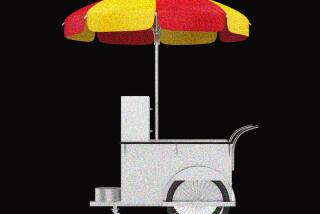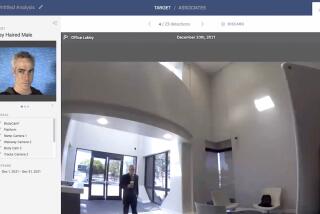Videotape Dispensers Ready to Make Splash : San Diego Firms Turn to Computers in Fight for Share of the $4.4-Billion Rental Market
- Share via
Over the next five years, computerized dispensing machines for videotapes will grab a significant share of the $4.4-billion rental market, now dominated by chain stores such as San Diego-based Video Library and Cevaxs of Canada. Both operate systems in supermarkets and convenience stores.
The two dozen U.S. companies developing video dispensing machines, or VDMs, range in size from tiny Vu-Tron of San Diego, which was founded less than two years ago, to giants such as Diebold Inc., the Canton, Ohio-based manufacturer that has built 45% of the 68,000 automated bank teller machines in the United States.
Large or small, VDM companies have generally been delayed in introducing their products because of a range of technical and marketing problems stemming from mechanical problems and the high cost of videotape inventory. Further complicating the business is this simple fact: Unlike most vending machines, video dispensers must be able to accept returns as well as dispense tapes.
Unique Requirements
Historically, many video vending ventures have failed because they were run by engineers with little or no understanding of the video business, which requires a unique and complicated marketing approach, inventory management and knowledgeable product decisions.
According to Vu-Tron President Frank Ryason, the prototypes of the first generation of VDMs were little more than “Pepsi machines” with simple lists of movie titles that didn’t properly market the movies available within.
As of December, only about 1,000 VDMs were installed nationwide, and no clear leader had emerged among the many manufacturers vying for prominence in the market. But industry sources such as Video Marketing, a Los Angeles-based market research company that tracks the video rental industry, says the problems with VDMs are being overcome and the number of those being installed will increase dramatically starting next year.
One reason for the improved outlook is that machines such as those made by Vu-Tron and Diebold do a better job of enticing customers to rent tapes. Both companies’ machines have attractive consoles that show back-lit color transparencies--essentially miniature promotional posters designed by movie producers--of up to 200 available movie titles.
After many months of software design, Vu-Tron, which will ship its first 10 machines later this month, has developed a system that accepts and verifies bank credit cards, the main method of payment. Vu-Tron and Diebold each feature on-line software that keeps track of inventory and communicates accounting and marketing information back to a host computer system.
These and other industry developments have prompted Video Marketing to project in a recent market survey that the installed base of VDMs will jump from about 3,200 at the end of this year to about 11,600 by 1989 and 23,000 nationwide by the end of 1991.
While Video Marketing describes itself as somewhat skeptical compared with other analysts about VDMs’ chances of market penetration, executive editor Ira Mayer said Monday that 8% of all video rentals may be done through VDMs by 1992.
“We see VDMs as being a niche market, with machines being placed in places like hotels, where it is not as necessary to be rotating inventory as rapidly as in the specialty stores for example,” Mayer said.
Others see a much broader market for VDMs, envisioning a time when they take over the estimated 24,000 manual “rack systems” in convenience stores, supermarkets and other retail locations nationwide. (There is a roughly equal number of video specialty stores such as Video Library currently in operation nationwide, according to Video Marketing.)
VDMs could also be placed in apartment and condominium complexes as well as alongside soft-drink machines in office buildings, said Ted Crooks, Vu-Tron’s director of marketing and software programming.
However fast the market grows, there is certain to be stiff competition. In San Diego alone, two companies in addition to Vu-Tron are developing video dispensing machines. Vertx of San Diego said it recently signed a $1.8-million contract to supply 150 or more of its VDMs to Video Library.
In addition, Vertx President Lewis Barnes said his company has an agreement to supply Hotel Cinema Corp. of America with as many as 1,025 video dispensing machines over the next three years, potentially a $9.5-million contract. Vertx put its first prototype machine in operation last July.
Vertx describes itself as a publicly held research and development company that orders its machines under license from Sankey Vending, a large United Kingdom-base manufacturer. Vertx, which also sells cigarette vending machines, has given Sankey the right to sell its VDM design in the European market.
Vend-a-Video
Another San Diego company trying to develop a VDM is Vend-A-Video, a wholly owned subsidiary of Term-Tronics, also based in San Diego. Vice President Bruce Kociemba said that the company completed its first VDM prototype in 1985 but that shipment of completed machines has been delayed by technical problems.
Vend-A-Video is currently short of capital, a situation it hopes will be remedied later this year with a “major funding and operations deal” with a company Kociemba declined to identify.
“We have contracts but they must remain confidential,” he said.
A Diebold spokeswoman said her company signed its biggest contract yet in January to supply Nelson Vending Technology, a Toronto company, with 400 VDMs by the end of this year. Nelson will operate a network of the machines to be placed mainly in convenience stores, drugstores, supermarkets and gas stations.
Diebold, which dominates sales of ATMs in the United States, plans to gradually expand its VDM sales city by city in coming years. “Video vending will be a small part of our overall business, but we have high hopes for it,” Diebold’s Mary Anne Jackson said.
How will Vu-Tron prevail against heavily capitalized competitors such as Diebold? Crooks said Vu-Tron got a big vote of confidence earlier this year when it sold 52% of its stock to Cevaxs, a closely held Vancouver, British Columbia, company that operates 13,000 “rack systems” or full-service video rental systems in convenience stores and other retail outlets in Canada and in the United States. Among Cevaxs’ locations are 5,000 7-Eleven stores throughout the nation.
If you subscribe to the theory that most, if not all, of the “rack systems” now in operation across the nation may someday be replaced with VDMs, then Cevaxs’ size makes it the “largest possible customer” for Vu-Tron machines in the industry, Crooks said.
“Being teamed with Cevaxs, we have the benefit of their dominant marketing experience and our own technical capability,” Crooks said.






